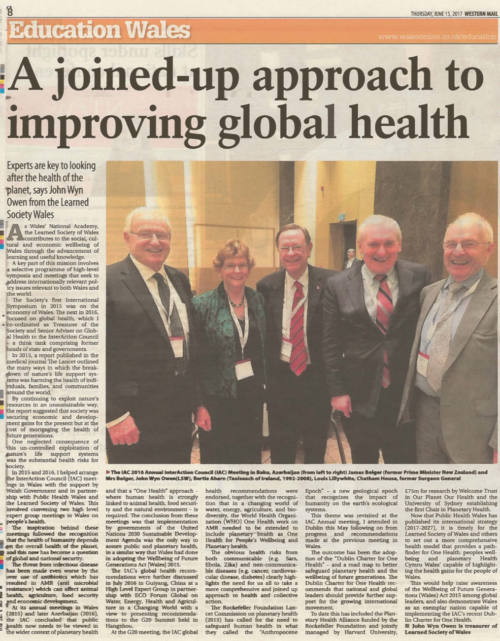One Health Wales: The importance of People’s Wellbeing and Planetary Health Western Mail Column

On Thursday 15 June, the Society published the following column by Professor John Wyn Owen FLSW in The Western Mail
As Wales’s National Academy, the Learned Society of Wales contributes to the social, cultural and economic wellbeing of Wales through the advancement of learning and useful knowledge. A key part of this mission involves a selective programme of high-level symposia and meetings that seek to address internationally relevant policy issues relevant to both Wales and the World.
The Society’s first International Symposium in 2015 was on the economy of Wales. The next in 2016, focused on global health, which I coordinated as Treasurer of the Society and Senior Adviser on Global Health to the InterAction Council- a think tank comprising former, heads of State and Governments.
In 2015, a report published in the medical journal, The Lancet outlined the many ways in which the breakdown of nature’s life support systems was harming the health of individuals, families, and communities around the world. By continuing to exploit nature’s resources in an unsustainable way, the report suggested that society was securing economic and development gains for the present but at the cost of mortgaging the health of future generations. One neglected consequence of this un-controlled exploitation of nature’s life support systems was the substantial health risks for society.
In 2015 and 2016, I helped arrange the InterAction Council (IAC) meetings in Wales with the support by Welsh Government and in partnership with Public Health Wales and the Learned Society of Wales. This involved convening two High Level Expert Group meetings in Wales on people’s health. The inspiration behind these meetings followed the recognition that the health of humanity depends on the overall health of the planet, and this now has become a question of global and national security. The threat from infectious disease has been made even worse by the over use of antibiotics which has resulted in AMR (Anti Microbial Resistance) which can affect animal health, agriculture, food security and economic development.
At its Annual meetings in Wales (2015) and later Azerbaijan (2016), the IAC concluded that public health now needs to be viewed in the wider context of planetary health and that a ‘One Health” approach-where human health is strongly linked to animal health, food security and the natural environment is required. The conclusion from these meetings was that implementation by governments of the United Nations 2030 Sustainable Development Agenda was the only way to assure public and planetary health, in a similar way that Wales had done in adopting the Wellbeing of Future Generations Act [Wales] 2015.
The IAC’s global health recommendations were further discussed in July 2016 in Guiyang, China at a High Level Expert Group in partnership with ECO Forum Global on Water, Energy, Health and Agriculture in a Changing World with a view to presenting recommendations to the G20 Summit held in Hangzhou. At the G20 meeting, the IAC global health recommendations were endorsed, together with the recognition that in a changing world of water, energy, agriculture, and biodiversity, the World Health Organization (WHO) One Health work on AMR needed to be extended to include planetary health as ONE HEALTH for Peoples Wellbeing and Planetary health.
The obvious health risks from both communicable (e.g. SARS, Ebola ,Zika) and Non-Communicable Diseases (e.g. cancer, cardiovascular disease, diabetes) clearly highlights the need for us all to take a more comprehensive and joined up approach to health and collective action
The Rockefeller Foundation Lancet Commission on planetary health (2015) has called for the need to safeguard human health in what they called the “Anthropocene Epoch” –a new geological epoch that recognizes the impact of humanity on the earth’s ecological systems. This theme was revisited at the IAC Annual meeting, I attended in Dublin this May following on from progress and recommendations made at the previous meeting in Wales. The outcome has been the adoption of the ‘Dublin Charter for One Health’ – and a road map to better safeguard planetary health and the wellbeing of future generations
The Dublin Charter for One Health recommends that national and global leaders should provide further support for the growing international movement. To date this has included the Planetary Health Alliance funded by the Rockefeller Foundation and jointly managed by Harvard University, £75m for research by Welcome Trust in Our Planet Our Health and the University of Sydney establishing the first Chair in Planetary Health
Now that Public Health Wales has published its international strategy (2017-2027), it is timely for the Learned Society of Wales and others to set out a more comprehensive health model that provides a pathfinder for “One Health: peoples wellbeing and planetary Health Cymru Wales’ capable of highlighting the health gains for the people of Wales. This would help raise awareness of the Wellbeing of Future Generations (Wales) Act 2015 among global leaders, and also demonstrate Wales as an exemplar nation capable of implementing the IAC’s recent Dublin Charter for One Health.
John Wyn Owen, Treasurer: Learned Society of Wales
Photograph Left to right
HE James Bolger (former Prime Minister New Zealand) and Mrs Bolger, John Wyn Owen,(LSW) HE Bertie Ahern (Taoiseach of Ireland, 1992-2008), Louis Lillywhite, Chatham House, former Surgeon General at the IAC 2016 Annual InterAction Council (IAC) Meeting in Baku Azerbaijan.